WASHINGTON — City leaders and Senate allies announced the reintroduction of a bill that would admit Washington, D.C., as a U.S. state on Tuesday. D.C. Delegate Eleanor Holmes Norton, Sen. Tom Carper (D-Del.) and D.C. Mayor Muriel Bowser were among the featured speakers to urge for D.C. statehood.
“For me today, it’s personal,” said Norton. “For three generations, my family has yet to obtain the rights of statehood.” While Norton is not a senator with legislative voting powers, as a delegate, she can still introduce bills in the House, which she has now done three times.
The Washington, D.C., Admission Act has endured a long and onerous road through Congress. First introduced by Norton in early 2019, it passed through the House along party lines.
Sen. Carper, Norton’s longtime partner in this endeavor, brought it to the Senate, where it was recommended to and subsequently died in the Committee on Homeland Security and Governmental Affairs. Minority Leader Mitch McConnell (R-Ky.) said he had no intention of granting a floor vote to a D.C. statehood bill. The process repeated itself in 2021, with the bill passing through the Democratic House and dying in the split Senate.
Now, Senate Democrats are leading efforts to reintroduce the bill after Republicans took control of the House in the 2022 midterms. Carper again took point on the attempt, supported by Sen. Chris Van Hollen (D-Md.).
“Every day, we work in the shadow of our Capitol, a beacon for democracy around the world,” Carper said. “And yet, a historic injustice still prevails.”
D.C. residents pay the highest percentage of their income in federal taxes per capita out of any state in the country, yet “have no say in how those dollars are spent,” Carper said. D.C. statehood is also popular among Americans: A 2021 Democracy for All poll cited by Norton says that 54% of voters support making D.C. a state.
The Delaware Senator referred to the Republican-controlled House as the “elephant in the room.” He then argued for bipartisan support by quoting Mike Pence’s 2007 senate floor remarks in support for D.C. statehood.
Like Norton, Bowser appealed to the personal nature of this issue. “We bear all the responsibilities of statehood. But we have to endure on a daily basis the offense of looking up at this building and knowing that we do not have the votes in this building.”
Bowser continued, “In a country built on the premise that no one should be taxed without being represented, 700,000 Americans endure that every single day.”
The “taxation without representation” argument is commonly used by proponents of D.C. statehood, evoking images of the original fight for American independence. The Democracy for All poll noted that using this argument increased the number of voters who support statehood to 58%, including 42% of Republicans.
“This is not a power grab,” said Bowser. “None of us are saying we want more than our fair share. This is about democracy and about us achieving our full rights as American citizens.”
City Council Chairman Phil Mendelson pointed out specific ways that D.C.’s current status has hurt its government and citizens: A large portion of seats on the D.C. Courts of have been left vacant; laws proposed by the City Council are delayed due to their 30 or 60-day Congressional sitting period; and D.C. citizens and federal employees are at the mercy of government shutdowns.
Most pressingly, the D.C. government cannot mobilize their own National Guard; rather, the president has this responsibility. On the day of the Jan. 6 insurrection, the Department of Defense took three and a half hours to approve and convey the D.C. mayor’s requested deployment of the DCNG to the Guard’s commanding general. All the while, rioter Ashli Babbitt was shot and killed and Capitol Police officer Brian Sicknick was attacked. He later died of a related stroke.
As Van Hollen pointed out, there were many members of the D.C. Metropolitan Police who responded to the Jan. 6 attack alongside members of the Capitol Police. “The men and women of the Metropolitan Police were not able to vote for the members of the House or Senate who they were protecting. And that’s shameful.”


